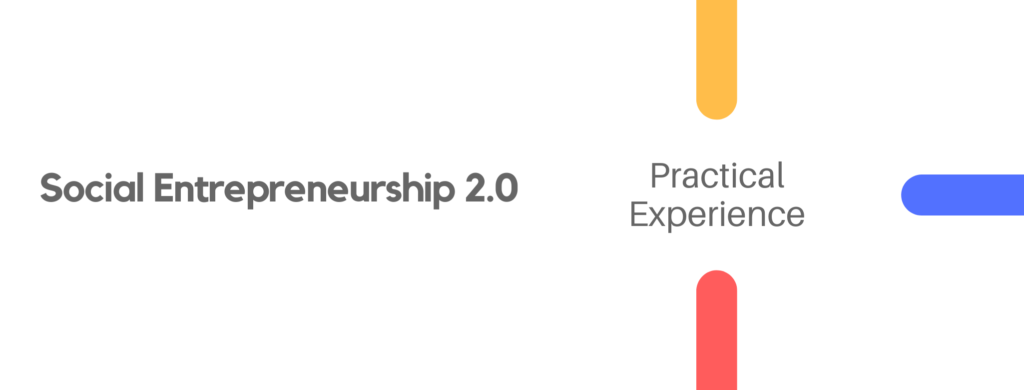Course: Social Entrepreneurship 2.0
Social Entrepreneurship in Theory and Practice
SUMMARY
The aim of this course is that students should develop an understanding of the Social Entrepreneurship Theory and Practice, which is rapidly garnering attention around the world from policy makers, organizations and others. As the traditional lines blur between nonprofit enterprises, public services and business, it is critical that students understands the opportunities and challenges in this new landscape.
Course description
The course provides students with an orientation in this developing landscape as well as knowledge and skills to lead organizational development in practice. The course is open to students from various backgrounds seeking to develop skills in leadership and organization within the field of Social Entrepreneurship and Innovation.
Learning outcomes
Applying knowledge and understanding
Upon completion of this course students will:
- Acquire a critical understanding of the field of social entrepreneurship and innovation and its development in a global context
- Demonstrate a critical understanding of perspectives and tools for approaching the challenges of organizational development within the field of social entrepreneurship
Skills and abilities
Upon completion of this course students will be able to:
- Discuss and relate to literature, discourse and policy on social entrepreneurship and innovation
- Find, evaluate and synthesize current research on social entrepreneurship related to the student’s particular area of interest
- Make informed decisions on choice of management models, strategies of communication and in handling a project or organization’s relation to its context
Assessments
Forms of examination include:
Module 1: Social Entrepreneurship and Innovation in theory and practice
- Written report on group work. This includes presenting the findings at a seminar. Grade: fail/pass/pass with distinction
- Individual report. Grade: fail/pass/pass with distinction
Module 2: Think piece
- Think piece. Grade: fail/pass/with distinction
Course content
The course is divided into two modules: Social Entrepreneurship and Innovation and Think piece.
Module 1, Social Entrepreneurship and Innovation in theory and practice, cover the following topics:
- Research and policy on Social Enterpreneurship, Social Innovation and related concepts
- How can Social Entrepreneurship apply to sustainable development, especially in urban and global contexts
- Leadership and organization in Social Entrepreneurial organizations and partnerships: Management, strategy and communication
- Network and support structures
- Resource based theory and social capital
- Community and Social Entrepreneurship
Module 2, Think piece, consists of research work. Here students, individually or in pairs, can focus on an issue where they have a special interest within the field of Social Entrepreneurship and Innovation.
Learning activities
Teaching methods include lectures, field trips, seminars and case work.
|
S |
Hours |
Hours/ per day |
Weeks |
Lectures/ Seminars |
Field trips/ Guest lectures |
Group work |
Individual work |
Think piece supervision |
|
S1 |
100 h |
1h/pd |
20 |
30 |
10 |
30 |
20 |
10 |
|
S2 |
200 h |
1h/pd |
40 |
60 |
20 |
60 |
40 |
20 |
S – Scenarios
Grading system
Fail, Pass or Pass with Distinction.
Course literature and other teaching materials
Books
- Booth, W.C., Colomb, G.G. & Williams, J.M. (2003). The craft of research. University of Chicago Press, Chicago.
- Henriques, A. & Richardson, J. (ed). (2004). The triple bottom line, does it all add up? Assessing the sustainability of business and CSR. Earthscan, London.
- Light, P, L. (2008). The Search for Social Entrepreneurship. Brookings Institution Press, Washington.
- MacCallum, D., Moulaert, F., Hillier, J. & Vicari Haddock, S. (ed). (2009). Social innovation and territorial development. Ashgate, Farnham.
- Steyaert, C & Hjort, D (ed.). (2006). Entrepreneurship as Social Change. Edward Elgar Publishing, Cheltenham.
- Yin, R.K. (2003). Case Study Research: Design and Methods; Third Edition, Applied Social Research Methods Series, Vol 5. Sage, London.
Articles:
- Austin et al. ”Social and commercial entrepreneurship: Same, different or both?”, Entrepreneurship Theory and Practice, January 2006.
- Cook, B, Dodds, Ch & Mitchell, W. 2003: “Social Entrepreneurship – False premises and dangerous Forebodings”. Australian Journal Of Social Issues Vol. 38 No. 1 (February 2003) p. 57-71.
- Håkansson & Sjöholm. ”Who Do You Trust? Ethnicity and Trust in Bosnia and Herzegovina”, Europe-Asia Studies, 2007, 59:6, 961 – 976.
- Lister, Ruth. ”Citizen in action: Citizenship and community development in a Northern Ireland context”, Community Dev. J.,July 1998:33, pp 226 – 235.
- Mari & Martí. ”Social entrepreneurship research: A source of explanation, prediction, and delight.” Journal of World Business, 41: 2006, pp. 36-44;
- Martin, Roger L & Osberg, Sally. ”Social entrepreneurship: the case of definition”, Stanford Social Innovation Review, Spring 2007.
- Putnam, R.: Making democracy work. 1993.(Ch. 6)
- Quibria, M.G. ”The Puzzle of Social Capital. A Critical Review”, Asian Development Review, 2003, vol. 20, no. 2, pp. 19-39.
- Shaw, M., & Martin, I. 2000. “Community work, citizenship and democracy: re-making the connections.” Community Development Journal, 35:401 – 413.
- Spector, B. “Business Responsibilities in a Divided World’: The Cold War Roots of the Corporate Social Responsibility Movement”. Enterprise Soc (2008) 9 (2): 314-336.
- Steyaert, C & Katz, J. 2004. “Reclaiming the space of entrepreneurship in society: geographical, discursive and social, dimensions.” Entrepreneurship and Regional Development, 16(3): 179-196.
Other literature in the form of current articles for specific seminar occasions may be added, as well as other literature in consultation with the course coordinator.
Course evaluation
Each module in the course will be evaluated separately upon completion. This provides periodic feedback on course development. The course as a whole will also be evaluated on completion. A summary of results will be kept in archive.
